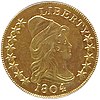Wikipedia:Today's featured article/February 19, 2013
The Turban Head eagle was a ten-dollar gold piece, or eagle, struck by the United States Mint from 1795 to 1804. The piece was designed by Robert Scot, and was the first in the eagle series, which continued until the Mint ceased striking gold coins for circulation in 1933. The common name is a misnomer; Liberty does not wear a turban but a cap, believed by some to be a pileus or Liberty cap: her hair twisting around the headgear makes it appear to be a turban. The number of stars on the obverse was initially intended to be equal to the number of states in the Union, but with the number at 16, that idea was abandoned in favor of using 13 stars in honor of the original states. The initial reverse, featuring an eagle with a wreath in its mouth, proved unpopular and was replaced by a heraldic eagle. Increases in the price of gold made it profitable for the coins to be melted down, and in 1804, President Thomas Jefferson ended coinage of eagles; the denomination was not struck again for circulation for more than 30 years. Four 1804-dated eagles (one shown), which were struck in 1834 for inclusion in sets of US coins to be given to foreign potentates, are among the most valuable US coins. (Full article...)
Recently featured: White-bellied Sea Eagle – Eagle (comic) – History of Lithuania (1219–1295)

